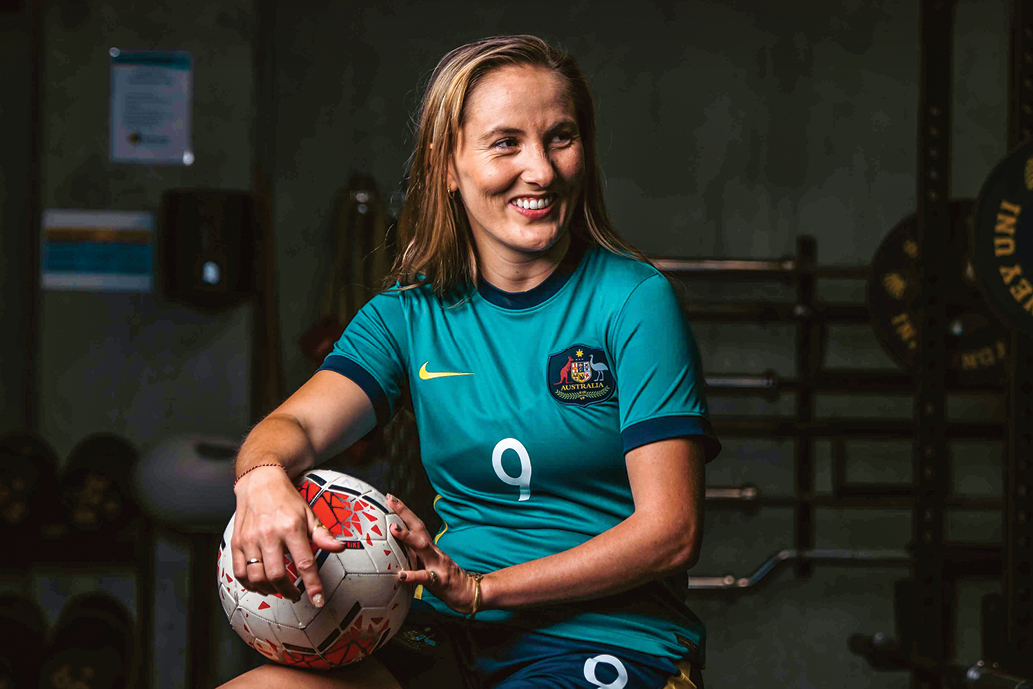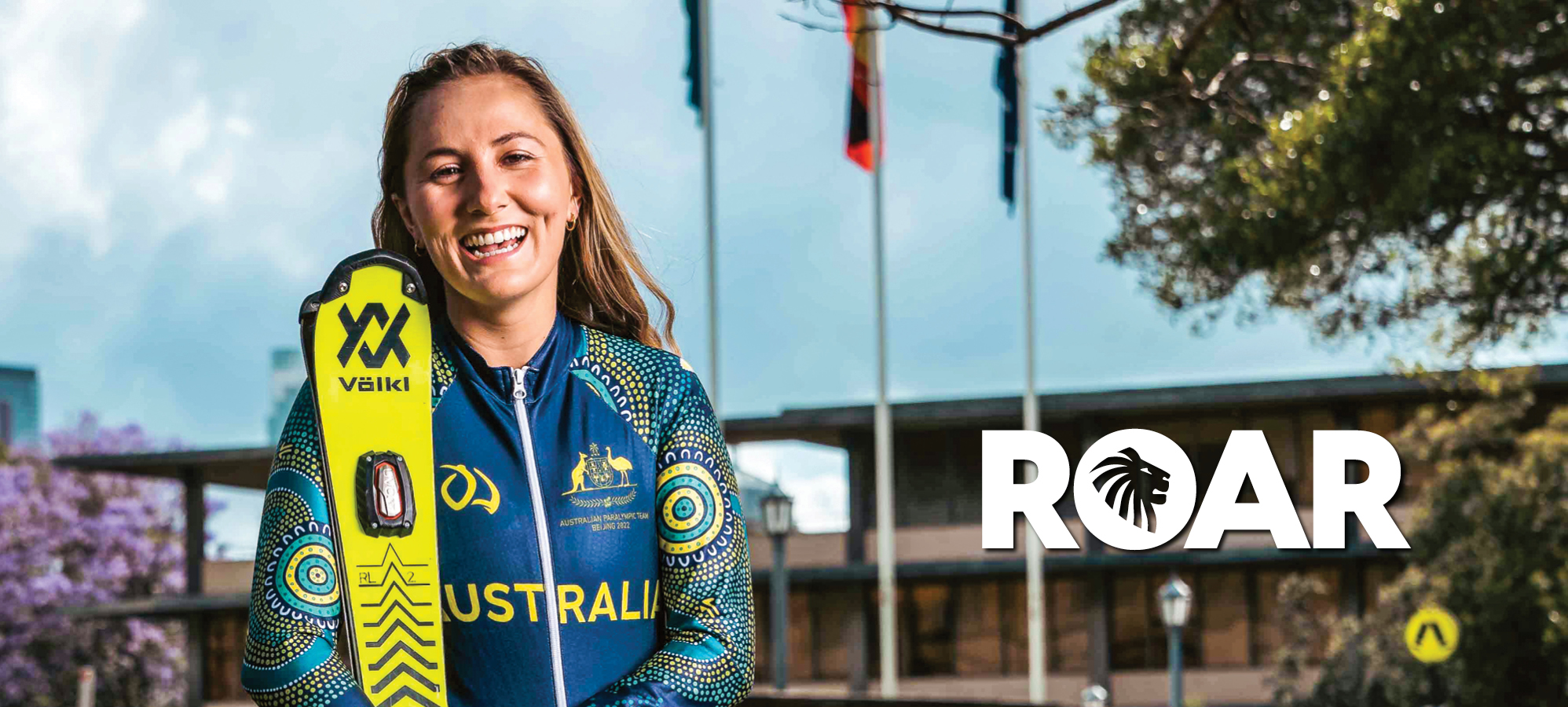Paralympian Rae Anderson holds the rare milestone of competing at both the Summer and Winter Paralympic Games. She is one of seven athletes in Australia to have achieved this feat. In this interview she talks about her aspirations in the para-sporting community, overcoming adversity and her return to socceras a Para Matilda.
CHAMPIONING ADVERSITY
It takes a special athlete to compete with the best in the world in the slalom at the 2022 Beijing Paralympic Winter Games, then return home to take up duties with the Para Matilda’s women’s football squad.
But Rae Anderson is a special athlete, whether she is competing in the long jump, throwing the discus or javelin, powering down dangerous slalom runs, or kicking a football– all at international level.
Playing multiple sports from a young age, Rae was selected in primary school to train with Paralympian Evan O’Hanlon, dubbed Australia’s most successful male athlete with a disability. Rae trained with Evan and his coach which set heron a path to becoming an elite athlete at the age of 15.
“My coach was very focused on me having a very normal progression as an athlete and not just getting in, getting a medal and getting out,” she says. “At the time I was really upset because I wanted everything now but that’s just what’s ingrained in us. I think through his coaching and through what I’ve learnt through sports, the way he set me up is to have longevity in the sport and to be able to enjoy the small moments. It’s not necessarily about the medals but also the quality of life that I have through sport.
”Rae made her international debut as a 17-year-old in the long jump for T37/38 athletes at the 2014 Glasgow Commonwealth Games, which set her on a pathway for para-athletics. In2015, she represented Australia at the IPC Athletics World Championships at Doha, Qatar, where she placed sixth in the women’s javelin F37 and seventh in the women’s discus F37.She competed in the javelin event on the same day as sitting her final exam for her High School Certificate.
Following impressive performances in javelin and discus in her debut at the2016 Rio di Janiero Paralympic Games, she competed in both disciplines at the 2017 IPC Athletics World Championships in London. It seemed that everything was going to plan and then Rae’s dreams as a para-athlete were shattered when the javelin discipline was struck from the 2020Tokyo Paralympic Games. “I lost it. That was my life and my identity,” she says.
Rae took a year off to focus on her studies. Focusing on her university degree, a Bachelor of Arts majoring in Asian and Indonesian Studies, honed her desire for what she wanted to pursue later in life – building up para-sport communities in Asia and opening those same pathways for para-athletes that she was able to take advantage of herself.
But fate played a hand while she was on a skiing trip with her family and was scouted as an alpine slalom skier, setting her on a new road that would eventually lead to the 2022 Beijing Winter Paralympics. The transition from athletics to alpine skiing was a lot harder than imagined. Rae received a scholarship through the Elite Athlete Program (EAP), run by Sydney Uni Sport & Fitness, which helped set her up as a para-athlete in her training while balancing her studies.

“The University of Sydney made it so easy to do both. When I went into alpine, I wanted to be a part of the EAP. Everything was so easy and so streamlined compared to before,” Rae says. “Alpine is such a lifestyle as you travel throughout the year, and are only home for four months of the year. I liked the experience that alpine gave me and through alpine skiing I think I learnt a lot about myself.
“I never believed in the division between male and female sexism in sports. I thought it was just talk because in athletics we were considered quite even. But in alpine skiing I found that I was excluded and looked down upon, and that I was never going to be the same athlete as I was female. I think the biggest thing there is that I have a worse disability. It’s not considered marketable. It’s not visible.”
Rae was born with left-sided hemiplegic cerebral palsy and at the age of five underwent major surgery to correct her foot and hip rotation, without success. At the age of seven, an operation was finally successful in rotating her hip back out and her foot further back. It left her in a wheelchair for over four months. “I think a lot of institutions back then just weren’t set up for wheelchairs. Even my high school had stairs everywhere,” she says.
Most public primary schools were not equipped to handle children with disabilities like this, making it harder for Rae to have the same integration. “I think it’s only a second thought, it only comes up when it becomes an issue, ”Rae says. “When I was in a wheelchair in primary school, they said ‘no, we can’t have you, there’s no way we can get you up the stairs.” As the school was on a hill, Rae’s dad had to push her up every day to school and her mum had to stay on as a teacher’s aide to help her.
Rae was classified as LW91, 1 being more affected than 2, LW meaning that only one side of her body is affected. “Because my disability is invisible, I’m a lot more affected by fatigue and weather conditions and because I hide it so well it’s not so noticeable how bad it actually is,” she says. “In skiing there was this expectation that I was going to blow it out of the park and through skiing there is this mindset that I’m nota high-performance athlete because I’m female, and because I’m a one and I just have it easy.”
WORK IN THE PARACOMMUNITY
Rae’s success has prompted her motivation to nurture future athletes in the same light, through her story and experiences. Through her work with Disability Sports Australia, Rae is at the forefront of helping young athletes with disabilities integrate into para-sports and overcome these barriers. It’s also from this that she can attest to the changes in the para-community, with more children attending public schools than ever before.“ Through my work I find out that kids are home-schooled because parents think they can’t put them in a mainstream school, or they send them to private schools because they think it’s going to be too hard in public school,” she says. “But I am finding that a lot more kids are going into mainstream schools and public schools, and they are having to adapt more for that and make it mainstream.”
As a child, Rae found it easier in primary school to maintain friendships and found that the differences in attitudes made it easier to adjust. “It’s easier as kids,” she says. “Kids adapt and it’s just normal for them. I have some incredible friendships from primary school. I think it’s high school where girls are more self-aware, and people start to understand disability and the stigmas associated with it. The conversations were a lot less about how we can adapt but how can we talk about this. Everyone tip toes around you.”
THE FUTURE IS FEMALE
Following her success at the Winter Paralympics in Beijing, Rae decided to come back home to her roots – soccer. Rae has been a Para Matilda since 2020; a passion she has pursued long and hard. “Through all my sports, I think this is the most support we’ve ever had,” she says. “It’s an incredible movement and it’s so exciting to be apart of it. I’m very invested in these girls and the para-football movement. I think Australia needs to invest in these girls. “Sport has allowed me to grow so much, especially alpine, in getting over some mental barriers that I didn’t know existed as a kid. I really struggled towards the end of high school because I didn’t medal, but my biggest issue with mental health is probably the way that these sports push us and certainly from a para perspective I really enjoyed my time in athletics.
“I’m disappointed that I was the last female to come through in alpine. We have a few girls coming through but none coming through on the elite high-performance team now. So, for me, we finally have a female football team that is so close and believe in each other so much and we have an incredible support team. It’s just such an empowering position to be in after alpine skiing, to have such incredible support from the girls and everyone behind us, it sends such a powerful message when we finally have female sport being aired.”
Rae Anderson’s inspirational journey continues.
